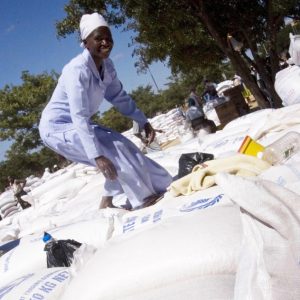The Stream, November 3: U.S. Considers New Routes For Dakota Access Pipeline
The Global Rundown
The United States may shift the route of the oil pipeline at the heart of fierce protests in North Dakota. A new report calls on the U.K. government to do more to prevent floods and build resilient communities. Saudi Arabia awarded an international water prize to eight scientists for their work to address water scarcity. Low water levels in Paraguay’s Pilcomayo River threaten caimans and livestock. Guinea worm, a parasite spread through water, may soon be eradicated globally.
“My view is that there is a way for us to accommodate sacred lands of Native Americans. And I think that right now the Army Corps is examining whether there are ways to reroute this pipeline.” — U.S. President Barack Obama, suggesting that the federal government may be seeking alternate pathways for the controversial Dakota Access oil pipeline in North Dakota. Clashes between protestors and police have intensified as the pipeline construction nears the Missouri River, upstream of drinking water intakes for the Standing Rock Sioux Reservation. (Reuters)
By The Numbers
17 Cases of Guinea worm that have been reported so far this year, indicating that the global fight to eradicate the parasite may be nearing its end. Health workers, however, face complications from conflict in the African countries where the worm persists, as well as an outbreak among dogs. The worm spreads through contaminated water. Reuters
5 million people Number in England who are at risk from floods. A new parliamentary report urges the government to take a more comprehensive approach to flood protection and prevention, including bolstering nature’s ability to trap floodwaters and enforcing higher standards for flood-resilient homes. Guardian
Science, Studies, And Reports
On Wednesday, eight scientists received the Prince Sultan Bin Abdulaziz International Prize for Water, awarded by Saudi Arabia to recognize scientific achievements that address water scarcity. The work of the winning scientists includes methods to predict cholera outbreaks and floods, research into meandering rivers and groundwater pollution, technology to increase energy efficiency in water treatment, and tools to improve water management. Associated Press
On The Radar
Water levels in the Pilcomayo River in Paraguay are at their lowest point in nearly two decades following multiple dry spells. The shrunken river has stranded some wild animals — including yacare caimans — and has also created water problems for ranchers. Reuters
A news correspondent for Circle of Blue based out of Hawaii. She writes The Stream, Circle of Blue’s daily digest of international water news trends. Her interests include food security, ecology and the Great Lakes.
Contact Codi Kozacek




